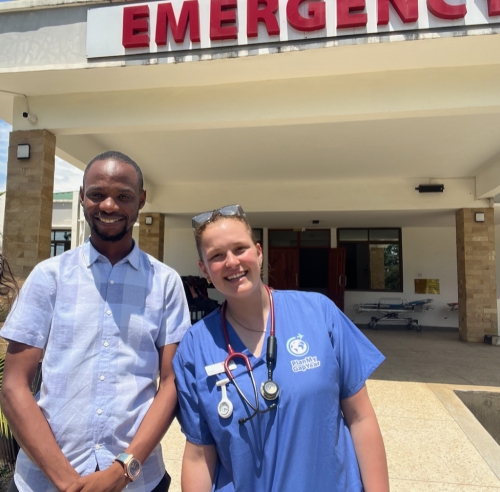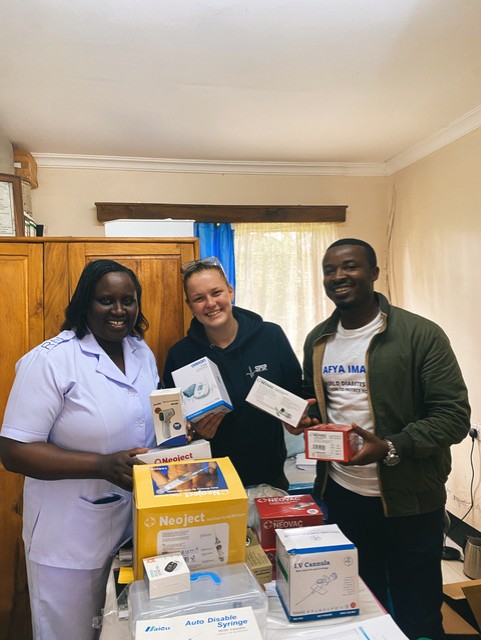
By Jordan Berger, final-year paramedicine student, ACU Paramedicine Society President
"International medical volunteering is a fantastic way to be involved in extra placements, explore the world, and prepare for a career in paramedicine"
As a student paramedic, gaining experience beyond clinical placements is a vital element of our learning that assists in solidifying the knowledge we have gained through our studies. It is also a great way to enlarge our skill set and bolster our confidence to prepare us for a career in the pre-hospital world. Expanding this education beyond borders, and taking our learning overseas, is a brilliant and certainly fun way to do so.
My name is Jordan Berger, and I am a final-year paramedicine student at the Australian Catholic University in Melbourne. Both travelling and volunteering have always been a love of mine, and when I discovered that I could combine them with my passion for paramedicine, I decided to do exactly that. To start off the New Year, I was fortunate enough to take my inquisitiveness to Tanzania with an organisation called Plan My Gap Year, where I worked closely with doctors and nurses in a small district hospital for four weeks.
During this time, and with the guidance of local Tanzanian healthcare professionals, I assisted with daily rounds, minor procedures, and even got to scrub in on surgical operations such as caesarean sections and salpingectomies. Through this, I worked on my bedside manner with people who did not speak English, giving me a chance to practise some Swahili and use basic hand gestures to build rapport with patients, as well as solidify my basic patient monitoring and assessment skills.
Observing open surgical procedures was also immensely valuable in learning about anatomy and physiology, as the surgeons were more than happy to explain the entire procedure to me and take time aside to answer my questions - an opportunity many paramedicine students would not receive in Australia.
Having spent a week in the Emergency Department, I also formed connections with the medical personnel there, which led to more learning opportunities, such as being involved in major trauma cases and being taught the suturing techniques used on such patients.
Floating around all the wards also gave me a chance to learn about more specialised areas, such as paediatric medicine and maternal care, which are crucial for paramedics. Working closely with unwell children and witnessing responses to neonatal emergencies gave me insights into the priorities of care for younger patients and the need for close vital observations and continual rechecking.
My ability to identify well versus unwell patients was also tested as I was often the first point of contact for patient assessments and had to alert doctors to any emergencies I detected. As a student, this was a great learning opportunity as babies often showed little to no physical symptoms, meaning I had to rely solely on vital sign numbers.
I also gained insight into tropical illnesses such as malaria and typhoid fever and found that, while these diseases are often feared in Australia, they are treated with little concern - much like a cold or flu here. Learning about medications not commonly used in paramedicine was fascinating, and observing patient treatments provided a valuable perspective, as some methodologies slightly differed from those in Australia.
One thing that I particularly found interesting was the differences in pre-hospital and paramedical care. Specifically, that there is no emergency ambulance service in Tanzania. In Australia, we are lucky enough to have highly trained professionals only one phone call away who are able to provide life-saving care and perform intricate interventions to stabilise patients en route to hospital.
Watching patients brought in unconscious on the back of motorbikes, or “boda bodas” as the locals call them, was something I never expected to see, and was definitely a moment I thought back to and felt grateful for what we have at home. In Tanzania, tuk tuk drivers are forced to become makeshift paramedics, and local bystanders are given the huge responsibility to help their community in need or leave them unassisted in the streets. This often means that patients are brought to the hospital in a critical condition, ultimately leading to poorer patient outcomes.
Despite the lack of paramedics in Tanzania, hospitals do have privately owned ambulances for inter-hospital transfers. However, these are simple 4WDs with beds in the back and minimal medical equipment. When I explained what paramedics are to the medical personnel at the hospital, they were impressed by the concept and shared how it could make a huge difference for them in the future if it ever became a possibility.
Beyond pre-hospital care, medicine itself is not vastly different. The understanding of pathophysiology is explained in much the same way as it is in Australia, and the treatment approaches taught to healthcare professionals also closely align. In Tanzania, I learned that the education system starts in Swahili in primary school, but from high school onwards all instruction is in English. As a result, when speaking with doctors, their medical knowledge was very similar to what we would learn in a bachelor’s degree and beyond, with the university structure relatively similar to that of Australia. This also meant they could rely on English-written global medical research to advance their practices as resources became more accessible.
But the truth is, no matter how hard they worked or how educated they were, their efforts were constantly limited by a lack of resources. I knew African healthcare systems would differ from Australia's, but I was not prepared to see the stark contrast between the two. Essential medical equipment that we take for granted in Australia was often broken or completely unavailable in the hospital. Vital medications and resources like oxygen were in such short supply that some people lost their lives or underwent procedures without adequate analgesia.
During some of the surgeries I scrubbed in on, the surgeons had to continue working while the power went out, leaving the operating theatre in darkness. As a student paramedic, one of the most striking moments for me was seeing their crash cart, which contained just a single tourniquet and no airway adjuncts whatsoever - something you would never see in Australia.
Observing this was at times challenging and confronting. Watching healthcare professionals do everything in their power for patients only to be held back by something as simple as not having the right tools, or seeing patients suffer due to a lack of funding, was difficult. However, it gave me a perspective I had not before experienced.
I gained a deeper understanding of why many procedures and policies exist in Australia and saw the significant impact medical research and advancements can have on both healthcare professionals and patients. Now, when returning home, I will be able to justify why certain tools are so important and know the true impacts if we did not have them. It also made me reflect on how fortunate we are in Australia and consider how the place in which we are born can dramatically influence the level of care we receive.
This experience was not only eye-opening for me but also highlighted the value of these opportunities for students. Experiencing healthcare in an under-resourced setting gave me a deeper understanding of the real-world challenges healthcare professionals face and the importance of innovation and resourcefulness in overcoming them. By taking up this opportunity, I was given the chance to contribute to making meaningful changes and gain a broader perspective on global healthcare. International medical volunteering is a fantastic way to be involved in extra placements, explore the world, and prepare for a career in paramedicine. I could not recommend this experience more highly!
Finally, throughout my time there, witnessing the immense limitations in the Tanzanian hospital motivated me to raise awareness of the issues and try to make a real difference. Alongside volunteering at the hospital, I was fortunate to raise more than $2,000 for the hospital. I personally went to a medical supplier and contributed to stocking their emergency department crash cart, purchasing cannulas and syringes, buying more than 100 oxygen masks, and providing high-quality stethoscopes for the doctors.
While these efforts were just a small step, they had a direct impact on the hospital’s ability to provide better care, helping bridge the gap between what was available and what was needed. It has also inspired me to continue to push for equality between our countries and continue supporting the hospital into my future, through further fundraising and medical shipments direct to them.
If you are interested in making a donation, you can do so at https://whydonate.com/en/fundraising/support-a-hospital-in-tanzania, and if you have any spare equipment, you can contact me at jordanbergertanzania@gmail.com. Any amount can and will make a difference.
Being in Tanzania showed me that being a student does not mean you are limited to Australian clinical placements or that you lack the ability to create change. For any student considering international medical volunteering, my advice is simple: Do it. It truly is an experience of a lifetime.


Get unlimited access to hundreds of ACP's top courses for your professional development.
Join Now